People love events. But what they love even more is knowing that their experience will be safe, secure, and enjoyable. It’s up to meeting planners and venue managers to team up together to ensure the health, safety, and security of every guest, no matter the type of event — and we’re here to help.
Want to make event safety management a top priority? Give attendees and stakeholders peace of mind during your entire event by using the safety and security tips in this article. Read on to find safety tips for large events, small events, and everything in between.
Event Risk Management and Safety Topics:
- Event safety vs. security
- Biggest safety risks at events
- Event safety as an event professional
- Safety and security tips for event planners
- Event security checklist (download)
Event Safety and Security: Meanings and Differences
Most event professionals will agree that safety and security at community events go hand-in-hand. But are “safety” and “security” really the same? While both involve protecting people, property, and assets against harm, it can be helpful to break down the difference between the two terms. The difference between event safety and event security is as follows:
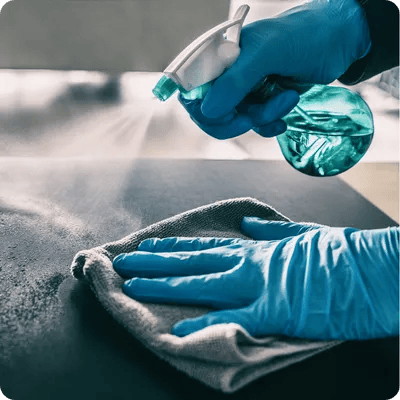 |
Event Safety:Event safety involves taking steps to protect people from bodily harm, health risks, and hazard-related threats that, left unattended, could cause harm, illness, loss, or death. Examples of event safety include sanitizing high-touch areas, eliminating trip and fall hazards, following food safety protocols, wearing masks to prevent the spread of illness, and more. |
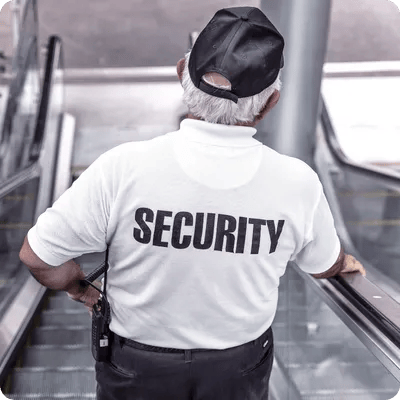 |
Event SecurityPublic event security involves protecting people, places, and things from external threats and criminal activities that could inflict harm to people, buildings, or assets. Examples of event security include using RFID wristbands for event access security, employing security staff members, using cyber security measures to protect data, and more. |
In review, event safety focuses on helping people feel safe and protected from factors that may cause bodily harm. Event security focuses on protecting people from external factors (such as an active threat, suspicious package, or unruly individual) that may cause an unwelcome situation at your event. Both topics combine to form proper risk management protocols for meetings and events.
The Biggest Safety Risks at Large Events
While focusing on what could go wrong at your event may seem counterproductive, it's actually an important mindset to have when planning any large event. Accidents happen, so have a plan in place that mitigate (or prevent) incidents both large and small.
There are infinite safety risks and security hazards a large event may face. Some are more serious than others, but it is up to event professionals and their teams to manage them efficiently. Some of the biggest safety risks at large events include the following:
|
|
Event Attendee Safety: Why It Matters
Event attendees want to know that their safety, security, and well-being are constantly prioritized at conferences, meetings, expos, and social events. The safest events often start with event management teams that think ahead on how to make experiences more secure.
Event professionals play a big role in ensuring that event attendees feel safe, operations are secure, and environments are kept clean and sanitary. Before you can create a well-rounded event safety and security strategy, however, it is important to understand the role you play in running a safe, well-protected event.
How Event Planners Manage Risks During Events
Event professionals contribute to the safety and security of events by conducting the following tasks:
- Putting health and safety arrangements in place to control risks
- Reviewing arrangements, as well as risk assessments, with the venue and suppliers
- Providing teams, vendors, and attendees with health- and safety-related information
- Evaluating the competence of event staff to properly uphold safety and security
- Upholding health and safety compliance from vendors, exhibitors, attendees, and staff
Event safety and security is certainly an expansive topic. Try to focus on achieving small steps along the way that complete the greater picture. Find more insight from Meeting Professionals International on why “going back to basics” is the best strategy when it comes to risk management for meetings and events:
Safety and Security Tips for Safe Meetings
What are the best practices to ensure safety and security at events? While there are countless strategies to get ahead of the game, we narrowed down five important tactics we believe every event planner can use and benefit from when looking to host safer, more secure events:
1. Conduct an event risk assessment.
You may be wondering, "What are the biggest safety risks at community events?" An event risk assessment answers this question by accomplishing three goals:
- Identifying potential hazards that could occur at your event
- Calculating the possibility of each risk
- Analyzing what could happen if a hazard occurs.
Some event risks have a higher priority and importance than others. We suggest using the event risk matrix to determine the priority level of each risk according to “impact” and “probability:”
- Impact: How seriously could the risk affect your attendees, venue, and assets?
- Probability: How likely is it that the risk will turn into a hazardous situation?
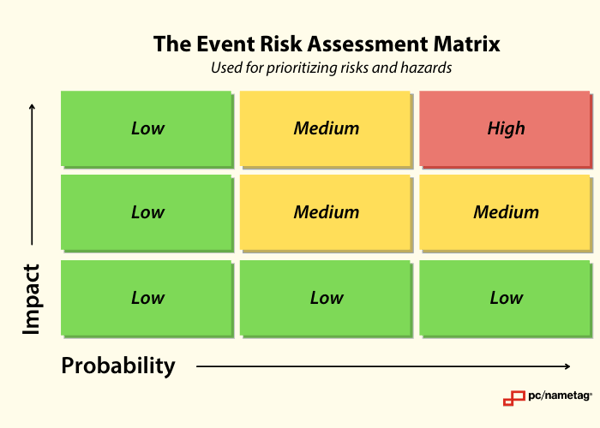
Click here to get your copy of the Event Risk Assessment Matrix.
As you’ll see, a risk with low impact and low probability will likely be of lower priority to your team, while a risk with a high impact and high probability is a risk your team should prepare for or mitigate as soon as possible.
The benefit of using this matrix is to decide whether your event is a “go” or “no-go” depending on safety, security, and budgetary needs. Use this resource to manage any and all risks of scheduling public meetings at a venue.
2. Design an event risk management plan.
Once risks and hazards are identified, you're ready to develop an event risk management plan. This plan will help you reduce, eliminate and/or mitigate risk at your meeting.
Incorporate the following methods in your event’s risk management plan to put you, your team, and stakeholders at ease:
- Elimination: Remove the hazard entirely by implementing a new process or altering a current one.
- Substitution: Replace dangerous situations with alternatives that are less dangerous.
- Design Alteration: Mitigate or contain the hazard through environmental design improvements.
- Administration: Work with your team to create safe operating procedures that benefit everyone.
- Training: Use effective methodologies and monitoring to help your team identify risks quickly.
Don't underestimate the power of multiple minds when creating your event risk management plan. Hosting discussions with your team can help you discover innovative and money-saving solutions to tackle any issue you may face! At your next event safety plan meeting, cover the following questions.

Event Safety and Risk Management Plan Questions to Ask
Are you or your team involved in evaluating trending safety risks at events? Explore the following questions during your risk management plan brainstorming session:
-
- Does our team have an adequate budget to support security needs at the event?
- Have we developed a checklist that outlines safety-related tasks and logistical needs?
- Have we identified safety- and security-related equipment and emergency items we will need?
- Have we conducted a needs assessment for how many event staff we'll need to uphold safety?
- Have we coordinated with sanitation services to ensure proper cleanliness at the event?
- Do we have protocols for handling threats (I.e., weapons, explosives, active shooter, etc.)?
- Do we have an adequate evacuation plan in case of emergency or severe weather?
- Do we have cyber security measures in place to protect computer functions and data?
- Have we identified a public information specialist who will coordinate all media information?
- Have we surveyed the venue to identify hazards that could contribute to a potential threat?
- Is the venue easily accessible to police, fire, emergency rescue, and ambulance services?
- Does the venue allow for crowd control by means of security measures and physical barriers?
Discussing questions like these can be useful in helping your team minimize risk, explore risk management best practices at events, secure your event location, and find solid places to hold high-security meetings.

3. Refine your event crisis management plan.
Crisis management is one of the hardest challenges event planners face when it comes to safety planning and risk mitigation in the events world. A crisis management plan will help you prevent and mitigate unanticipated situations to best protect people, property, reputation, and assets.
The best risk management best practices at events start with a systematic and well-integrated approach to your event security plan. This way, you’ll be well prepared to handle sudden situations with a calm demeanor.
How to Create an Event Crisis Management Plan:
- Create a list of emergency key contacts for distribution. This will help your team quickly find and identify important information, especially when time is of the essence.
- Identify team members to join a crisis planning committee. This committee will be responsible for helping take action in case of an emergency.
- Create a crisis communications plan. Who will serve as your organization’s media spokesperson? How will information be shared with stakeholders in the event of an emergency?
- Establish systems and best practices to help your team detect early warning signs of a potential crisis. What “red flags” should your team be looking for before, during, and after your event?
- Identify crisis response procedures for everyone at your event. What actions should be taken in an emergency? Make sure to devise a “plan B” just in case.
- Do emergency simulations to test effectiveness. What worked? What didn’t? How could processes be made smoother and more efficient? Make changes as necessary, and test frequently.
Remember, although you may be calm, large groups may panic when faced with an emergency. Use your crisis management plan to help keep unanticipated situations under your control or consult with a professional for help.

4. Partner with a Global Biorisk Advisory Council® Accredited Event Venue.
Even the most robust event safety and security plan is rendered useless if the venue itself is not up to par. With many new requirements in place for hosting events, make it a priority to partner with event venues and convention centers that make safety and security top priorities.
A smart strategy is to work with venues that hold the Global Biorisk Advisory Council® (GBAC) STAR™ accreditation. This program is viewed as the gold standard for cleaning and outbreak prevention, response, and recovery in the events industry. The program provides venues with expert-led training and assesses their readiness for bio-risk situations like COVID-19 and other illnesses.
 |
Meg Statz, CMP, Events Services Manager at the Monona Terrace Community and Convention Center |
5. Share safety and security protocols with exhibitors and attendees.
One of the easiest ways to build trust and credibility with your attendees and exhibitors is to keep them in the loop, not only on general event information but also on your meeting’s safety and security protocols. This way, everyone will know what to expect when they arrive (such as health screenings, security clearances, sanitization protocols, physical distance requirements, etc.) Find additional top tips for safety information sharing below:
-
Consider sending a code of conduct statement to event participants.
This accomplishes two goals: to tell attendees what they can expect from the event host and the venue regarding health and safety measures and to convey what is expected of them while attending the conference. Be clear about safety and security expectations before, during, and after the event.
-
Design a safety plan for each event.
Advance planning is everything when it comes to attendee safety. Consider the attendees' journey from the minute they come through the door. How should they move throughout the building to improve safety and security? Safe spaces for events are important to attendees, and advance planning is a must.
-
Post safety and security information in easy-to-find locations.
Promotional emails, e-newsletters, text messages, social media pages, your event’s website, and your event app are all places that can feature safety- and security-related information. Use these platforms to share what protocols your team is taking to help attendees relax, have fun and make connections.
-
Use wearable technology to your advantage.
Radiofrequency identification (RFID) is a low-cost security option that event planning teams can use to gather attendee admission information and detect security access permissions. You can find full-color RFID wristbands for your event here.
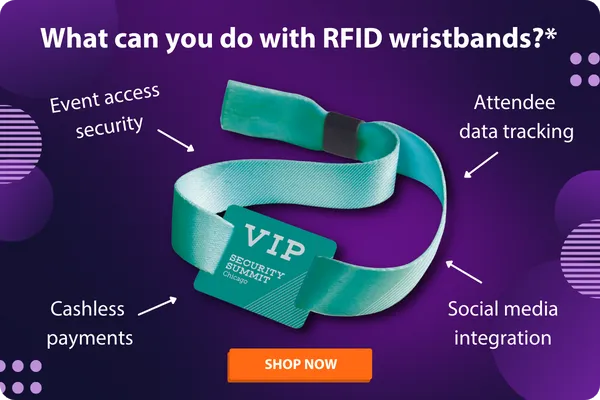
Your Event Security Checklist is here.
Every planner knows that taking proper precautions is a must when creating safe environments for event attendees to enjoy. Need event safety plan examples? Plan a safe event by downloading The Meeting Planner’s Event Safety Plan Checklist – a resource designed to help you collect and manage the following information:
- Emergency contacts
- Vendor and supplier information
- Venue safety planning tasks
- Risk management tasks
- Health and safety tasks
- Communication plan tasks
- Event safety plan circulation
- ...and more!
How do you ensure your meetings and events are safe? Let us know with a comment below!




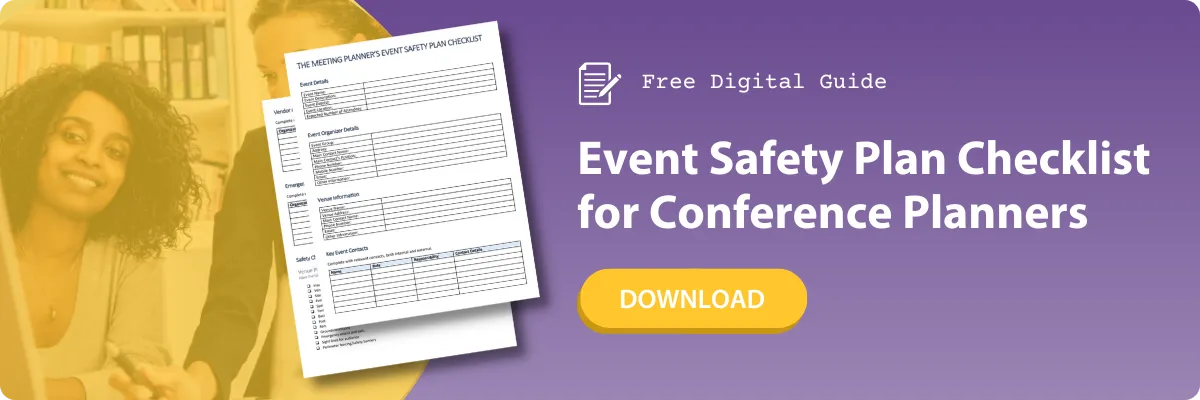
Submit a Comment